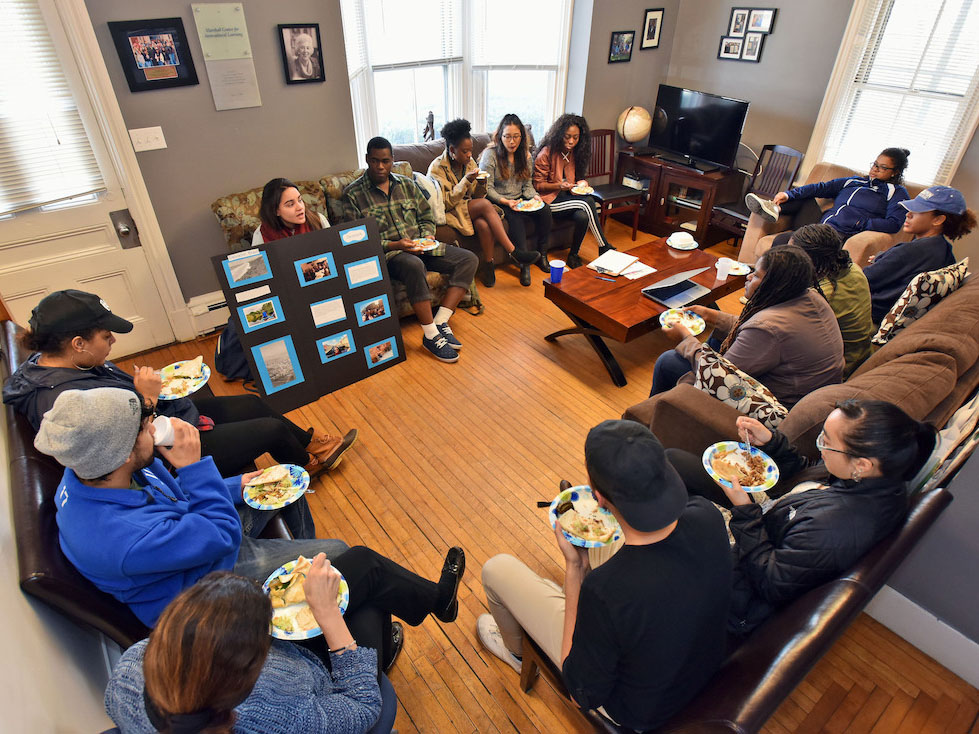Engaging with each ‘other’

Campus teach-in scheduled October 10
For the past few years, in the fall, the Wheaton community has gathered to work through important, sometimes difficult, topics together, in a series of teach-ins designed to keep people talking.
On October 10, the Marshall Center for Intercultural Learning will lead the latest event, a teach-in centered on the theme of “Engaging with the ‘Other.’” The event will begin at 2 p.m. in Cole Memorial Chapel, with a short opening talk by Loren Intolubbe-Chmil, an educator and activist who co-founded CoreCollaborative International, a consulting firm focused on catalyzing transformative practice and cultivating intercultural consciousness. Afterward, participants will split into groups to engage in discussions, led by a trained staff or faculty facilitator.
“We put ‘other’ in quotation marks because it’s a sort of fill-in-the-blank,” Marshall Center Dean Raquel Ramos said. “We’re asking you to think about who that ‘other’ is for you, about times when you’ve excluded people or othered them, or when people have othered or excluded you, and to explore that dynamic.”
Over the years, Wheaton has held teach-ins for a variety of purposes—as a response to an incident, such as after the violence in Charlottesville, Va., in 2017, and as the start of a conversation, such as last October’s Three Freedoms teach-in, which supported Wheaton’s membership in the Scholars At Risk network.
This year’s event will be based on a model presented at the Institute on Truth, Racial Healing and Transformation, hosted this past June at Villanova University by the Association of American Colleges and Universities, and attended by a group from Wheaton, including Ramos; professors Kate Mason, Srijana Srestha and M. Gabriela Torres; and Cassie Peltola, assistant director in the Center for Social Justice and Community Impact.
“The training helped us take stock of all the diversity, inclusion and equity work happening on the Wheaton campus. We returned with a potential roadmap for integrating conversations occurring in silo-ed spaces,” said Shrestha, assistant professor of psychology. “The training helped me add to my toolkit of strategies I can use in class to bring the personal stories of the students to the fore, such that they are able to see themselves in the texts they read.”
Faculty have been encouraged to incorporate the October 10 teach-in into their fall syllabi. Torres, who attended the summer institute, is having her “Medical Anthropology” students participate.
“[In this course] we work to understand the strangeness in how medicine views human bodies and to develop a nuanced understanding of the assumptions that we make when we engage with seeking health care,” she said. “These are difficult conversations and must be practiced regularly.”
Torres, professor of anthropology, said she hopes the teach-in gives all students the tools to talk through difficult subjects.
“For any kind of work our students might do in the future, and for our work on campus, learning to work with others whose perspective, values and life trajectory differ from our own is essential. This is anthropology’s bread and butter, so participation in this teach-in very much resembles the efforts we make in our own courses to understand the perspective of those who we believe differ from ourselves,” she said.
Peltola, who serves as assistant director for community service and civic engagement, said she hopes students take advantage of this opportunity to practice and build important skills, such as empathy.
“I hope that we can extend these kinds of conversations practically and intentionally to communities and contexts beyond Wheaton, as a way to move the dial forward on advancing our collective social consciousness and strive toward building a better, more empathetic and unified world,” she said.
The teach-in is one of many ongoing conversations happening at Wheaton. For the past seven years or so, the Marshall Center has trained students to lead weekly intergroup dialogues. This fall, the groups are focusing on individual lived experiences and challenging students to consider their differences, as well as similarities, in order to better understand one another, themselves and the world, Ramos said.
Shrestha has asked Ramos and Marshall Center Program Coordinator Kayla Berrios to lead similar dialogues, over three weeks, as part of her fall “Multicultural Psychology” course.
“One of the main objectives of my class on multicultural psychology is to offer students tools and opportunities to understand how our individual selves are constructed and to dialogue across differences. To this end, the partnership with Raquel and Kayla has been invaluable, since the intergroup dialogue is structured to allow every student to uncover and share their multiple identities in a brave and interactive space,” Shrestha said.
“Additionally, as we move toward our Compass Curriculum, we need to exploit every opportunity for collaboration between curricular and co-curricular educational activities for the benefit of our students,” she said.
